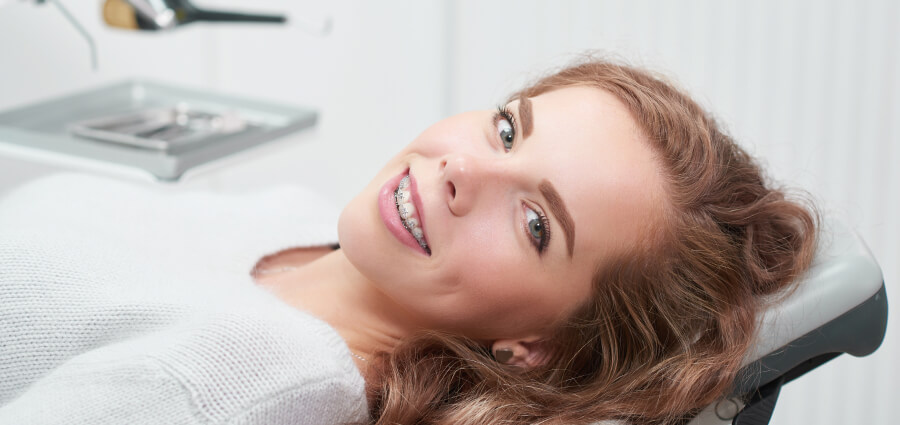Correct Your Open Bite and Improve Your Oral Health
Open bites are a type of orthodontic condition that can affect both adults and children and can result in difficulty eating, speaking, and smiling. Dr. Stephen Grussmark offers personalized orthodontic treatment to help get patients’ oral health back on track. Discover why patients in Brickell, Hialeah, and Coral Gables are in good hands with our South Florida orthodontist.
Call (305) 441-1200 today to schedule your consultation.

Causes of Open Bites
There are several potential causes of an open bite, including:
- Thumb-Sucking or Pacifier Overuse: Prolonged use of a pacifier or thumb-sucking can put pressure on the front baby teeth and cause them to push forward, resulting in an open bite.
- Tongue Thrusting: When a person has a habit of pushing their tongue forward against their teeth during swallowing or speaking, it can create a gap between the front teeth.
- Genetics: In some cases, an open bite may be inherited, with jaw or facial characteristics passed down through the family.
- Mouth Breathing: Chronic mouth breathing can cause the facial muscles and mouth to develop abnormally, leading to an open bite.
- Dental Abnormalities: Malocclusions or dental irregularities can lead to an open bite. For example, a discrepancy in the size of the upper and lower jaws can result in an open bite.
- Dental Trauma: An injury to the jaw or teeth can cause damage that leads to an open bite.


Symptoms of Open Bites
An open bite is a dental condition that can be identified by the following symptoms:
- Teeth Gap: The most obvious symptom of an open bite is a visible gap between the upper and lower front teeth when the jaws are closed.
- Difficulty Eating: People with an open bite may have difficulty biting into or chewing certain foods, especially foods that require a lot of pressure or force.
- Speech Problems: An open bite can also affect speech, causing a lisp or other impediments.
- Jaw Pain or Discomfort: In some cases, an open bite can cause pain or discomfort in the jaw or temporomandibular joint, possibly leading to temporomandibular joint disorder (TMJ).
- Breathing Difficulties: An open bite can sometimes lead to breathing difficulties, especially during sleep.
- Self-Consciousness About Appearance: An open bite can also affect a person’s confidence and self-esteem, especially if it’s visible when smiling or talking.
Treatment for Open Bites
Treatment for an open bite depends on the underlying cause and severity of the condition. The following are some treatment options for open bites:
- Orthodontic Treatment: Braces or clear aligners can move the teeth into the correct position and close the gap between the upper and lower front teeth.
- Jaw Surgery: In some cases, orthodontic treatment alone may not be enough to correct an open bite. Orthognathic surgery may be necessary to reposition the upper or lower jaw and create a more balanced bite.
- Speech Therapy: For people whose open bite is causing speech problems, your orthodontist may recommend speech therapy to improve speech and articulation.
- Myofunctional Therapy: Myofunctional therapy involves exercises to strengthen the facial muscles, which can help correct tongue thrusting and other habits that contribute to an open bite.
- Thumb-Sucking or Pacifier Cessation: If thumb-sucking or pacifier use is the cause of the open bite, it’s critical to stop the habit to prevent further damage.
Living with an Open Bite
While waiting for treatment, make sure to do the following to ensure good oral health:
- Practice good oral hygiene: Brushing and flossing regularly is crucial for maintaining oral health, especially during orthodontic treatment.
- Avoid habits that worsen the open bite: Habits like thumb sucking or tongue thrusting should be stopped to prevent further complications.
- Be mindful of your diet: Opt for softer foods that are easier to chew while your bite is being corrected.
- Maintain open communication with your orthodontist: Regular check-ups and following your dentist’s instructions are essential for successful treatment.
Frequently Asked Questions
The fastest way to fix an open bite would depend on the severity and cause of the condition. In mild cases, orthodontic treatment such as braces or clear aligners can move the teeth into the correct position and close the gap. In more severe cases, jaw surgery may be necessary to correct the underlying skeletal abnormalities.
An open bite may close naturally, especially in children, as their jaws grow and develop. However, if the open bite is due to skeletal abnormalities, it’s unlikely to close naturally without treatment.
The age to fix an open bite can vary depending on the case. Orthodontic treatment can typically begin in children as young as seven to eight years old, but the ideal age for treatment may vary based on the severity of the condition and the individual’s growth and development. In some cases, treatment may be postponed until the upper jaw has stopped growing, typically around 18 to 21 years old.
Whether or not insurance covers jaw surgery for open bites can depend on the individual insurance plan and the severity of the condition. Some insurance plans may cover jaw surgery if deemed medically necessary, while others may consider it a cosmetic procedure and not provide coverage. It’s best to check with your insurance provider to determine your coverage options.
Explore Personalized Open Bite Treatment Options
Do you have a bad bite? Our Miami, FL, orthodontist can evaluate your case and recommend the best treatment options. Get your open bite treated and don’t let it affect your confidence and dental health any longer. Schedule an appointment by calling our Miami, FL, office today at (305) 441-1200.
Dr. Grussmark works with patients all over the area, including West Miami, Coral Terrace, Westchester, and more.

